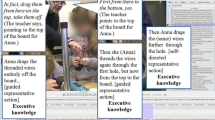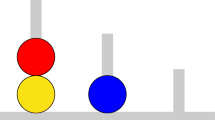Abstract
Our research goal is to use data-driven methods to generate the basic functionalities of intelligent tutoring systems. In open procedural problem solving environments, the tutor gives users a goal with little to no restrictions on how to reach it. Knowledge components refer to not only skill application, but also applicable skill-opportunity recognition. Syntax and logic errors further confound the results with ambiguity in error detection. In this work, we present a domain independent method of assessing skill-opportunity recognition. The results of this method can be used to provide automatic feedback to users as well as to assess users problem solving abilities.
Access this chapter
Tax calculation will be finalised at checkout
Purchases are for personal use only
Similar content being viewed by others
References
Barnes, T., Stamper, J.: Toward Automatic Hint Generation for Logic Proof Tutoring Using Historical Student Data. In: Woolf, B.P., Aïmeur, E., Nkambou, R., Lajoie, S. (eds.) ITS 2008. LNCS, vol. 5091, pp. 373–382. Springer, Heidelberg (2008)
Corbett, A.T., Anderson, J.R.: Knowledge tracing: Modeling the acquisition of procedural knowledge. User Modeling and User-Adapted Interaction 4, 253–278 (1994)
Croy, M.J.: Graphic interface design and deductive proof construction. J. Comput. Math. Sci. Teach. 18, 371–385 (1999)
Author information
Authors and Affiliations
Editor information
Editors and Affiliations
Rights and permissions
Copyright information
© 2012 Springer-Verlag Berlin Heidelberg
About this paper
Cite this paper
Eagle, M.J., Barnes, T. (2012). Data-Driven Method for Assessing Skill-Opportunity Recognition in Open Procedural Problem Solving Environments. In: Cerri, S.A., Clancey, W.J., Papadourakis, G., Panourgia, K. (eds) Intelligent Tutoring Systems. ITS 2012. Lecture Notes in Computer Science, vol 7315. Springer, Berlin, Heidelberg. https://doi.org/10.1007/978-3-642-30950-2_88
Download citation
DOI: https://doi.org/10.1007/978-3-642-30950-2_88
Publisher Name: Springer, Berlin, Heidelberg
Print ISBN: 978-3-642-30949-6
Online ISBN: 978-3-642-30950-2
eBook Packages: Computer ScienceComputer Science (R0)




